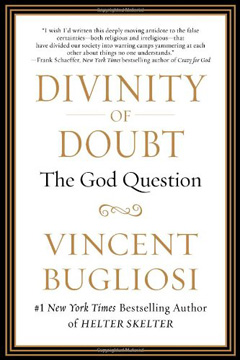With books like “Helter Skelter” and “The Prosecution of George W. Bush for Murder” under his belt, author Vincent Bugliosi is no stranger to writing about controversial topics, and his first career as an attorney has influenced his writing voice and his writing method.
“Divinity of Doubt: The God Question” is not a book about atheism. Bugliosi doesn't have an interest in being an atheist, but rather takes the Clarence Darrow approach to belief in God and classifies himself as an agnostic. He quotes Darrow:
“I do not pretend to know what ignorant men are sure of.”
Bugliosi isn't pretending he knows; he explores the belief that there is a God, while also looking at things logically. Rather than telling you what to think, he asks a lot of questions, which, in turn, encourage readers to reflect and ask questions of themselves and their own beliefs.
While Bugliosi is an opinionated writer, he is not confrontational. With a topic such as “does God exist?” it's easy for things to get out of hand and for a writer to offend. But Bugliosi's approach is more conversational. He points out errors in logic or brings up faults that both believers and atheists have in common. His quick wit and sarcasm, coupled with intense research and obvious understanding of the topic, result in an engrossing read.
Bugliosi's logical reasoning and intense probing of the God concept could make even the strongest believer in Christianity step back and look at religion through a new eye. Among the questions he raises, is the classic conundrum whether there can really be an all-knowing, all-powerful, all-good God. Bugliosi raises the point that no supreme being can be all three at the same time because “he either causes or at a minimum knowingly allows all the evil and horrors in the world to take place, doing nothing to prevent them.”
So, already, on page 36, Bugliosi challenges the classic description of the Christian god:
“If Christians insist on having a God, they can do so, but if they have any respect for logic, they'll have to redefine who he is,” Bugliosi writes.
The approach he takes works because he breaks down the arguments for a God and takes a closer look at what the arguments are made of, applying logic to the mysteries of God and religion.
And Bugliosi is certainly knowledgeable about this topic. It's evident that he has not only read through the Bible at great length, but has researched the other books written on atheism and agnosticism, even devoting a chapter to where those authors went wrong in their arguments against the existence of a God, thus making their books less credible as examples of intelligent atheism.
Bugliosi utilizes the Bible to enhance his arguments, frequently quoting passages and scriptures:
“The Bible is the most important single book, by far, in history, one that tells the greatest story (fictional or otherwise) ever told. And it does so with an unprecedented power and majesty that has resonated down through the centuries,” Bugliosi says. “It remains today undiminished, as popular and important to the world's culture and thought as ever. In a word, the Bible is not to be ignored.”
And neither is Bugliosi's book. Whether the reader believes in God or not, “Divinity of Doubt: The God Question” will spark conversation.
As Bugliosi says, “We are all at sea here, clearly dealing with an impenetrable mystery, a mystery that likely will never be solved.”
Although it is the nature of this particular mystery to be impervious to resolution, Bugliosi's book will inspire reflection – and – possibly – a new perspective on the deity.
4 Days Left: All gifts to Truthout now matched!
From now until the end of the year, all donations to Truthout will be matched dollar for dollar up to $44,000! Thanks to a generous supporter, your one-time gift today will be matched immediately. As well, your monthly donation will be matched for the whole first year, doubling your impact.
We have just 4 days left to raise $44,000 and receive the full match.
This matching gift comes at a critical time. As Trump attempts to silence dissenting voices and oppositional nonprofits, reader support is our best defense against the right-wing agenda.
Help Truthout confront Trump’s fascism in 2026, and have your donation matched now!
